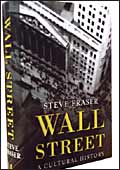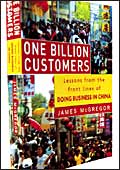 |
WALL STREET
By Steve Fraser
Faber & Faber
PP: 632
Price: Rs 770 |
You
can love the stock markets or you can hate the stock markets.
Ignore them, you can't. It doesn't matter who you are: A businessman,
a housewife, a salary man, or a politician. Everyone's life, one
way or another, is inevitably pulled by the mysterious money machine
that often spins chaotically, but always relentlessly. Play it
right, undreamt of riches could be yours; misread it, the result
can be fatal. In India-home to Asia's oldest stock exchange, the
Bombay Stock Exchange, founded in 1875 under a banyan tree-the
stock market culture is barely two decades old. But the extent
to which it has become a part of our everyday lives, is all too
apparent. Sale of everything from capital goods to something as
mundane as a grilled sandwich at a restaurant, is directly linked
to the stock market's performance.
Unfortunately, nobody as yet has documented
how India's growing obsession with its financial markets has impacted
the psyche of the nation. But if what they say about history repeating
itself is true, then India's capitalist future may have been foretold
in Steve Fraser's Wall Street: A Cultural History. A former teaching
fellow at Princeton, Fraser delivers a truly unique account of
the world's most powerful stock market. His account is at once
a chronicle of Wall Street's tumultuous history and a soul-baring
of American capitalism.
In this delightfully engaging work, you'll
encounter a variety of characters (ranging from a small-time "confidence
man, William Thompson, to the legendary financier J.P. Morgan),
a multitude of situations (the railroad boom and its impact on
Wall Street to the bombing of the House of Morgan), and many pieces
from contemporary Street history, including the dotcom boom and
the Enron and WorldCom scandals. When Fraser writes, "Even
in the teeth of the most stunning Wall Street frauds since the
crash of '29, people remain enamoured", it is impossible
to miss the truth it holds about the emerging Indian situation.
Scams have been as old as the stock markets themselves, but every
morning when the stock trader gets up to go to work, he thinks
of profits, not losses. It is this irresistible promise that fuels
the relentless money machine, be it on Wall Street or Dalal Street.
 |
ONE BILLION CUSTOMERS
By James McGregor
Nicholas Brealey Publishing
PP: 301
Price: Rs 800 |
CHINESE PUZZLE
Given the title of
the book, one Billion Customers, James McGregor may well be writing
about India and not China. McGregor, a former China bureau chief
for the Wall Street Journal and now a prosperous businessman in
China, points out how nothing-honesty, truth, contractual obligations,
partnerships and moral principles-is absolute or what it seems
in China. "Forget face, get the facts," he advises readers
as part of his do's and don'ts of negotiating in the complex,
contradictory and often treacherous market of China. And McGregor
illustrates all this through examples, borrowing from his own
experience of living for more than 20 years in China, first as
a journalist and now as a business consultant. In that sense,
the book-meant for anyone with interest or stake in China-is also
a "how not to do business in China" guide. For example,
McGregor advises his readers to avoid joint ventures with the
Chinese government, not to ignore the bureaucracy or the power
of lobbying. But more than anything, he says, if you have gotten
into a fight with either your Chinese partner or the government,
be tough. Apparently, the Chinese respect you for it.
|





